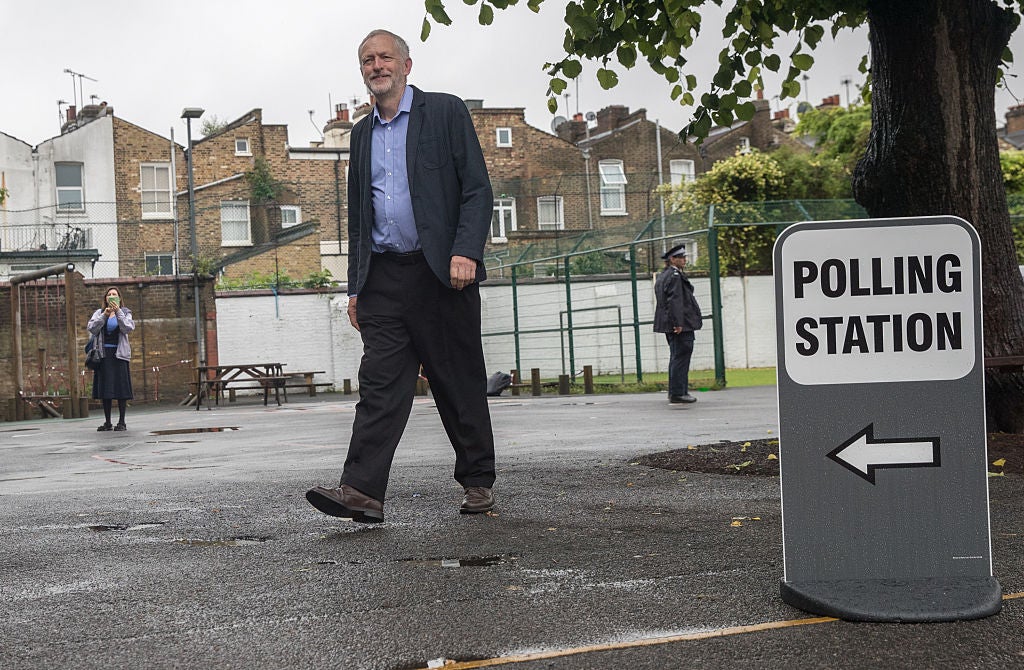Unity would be good for the Labour Party, as well as our democracy
If the likes of Hilary Benn, Yvette Cooper and Sadiq Khan could be persuaded to offer public unequivocal backing for Corbyn as prime minister – a big ask, given the past – they would be doing their party a much-needed service

Your support helps us to tell the story
From reproductive rights to climate change to Big Tech, The Independent is on the ground when the story is developing. Whether it's investigating the financials of Elon Musk's pro-Trump PAC or producing our latest documentary, 'The A Word', which shines a light on the American women fighting for reproductive rights, we know how important it is to parse out the facts from the messaging.
At such a critical moment in US history, we need reporters on the ground. Your donation allows us to keep sending journalists to speak to both sides of the story.
The Independent is trusted by Americans across the entire political spectrum. And unlike many other quality news outlets, we choose not to lock Americans out of our reporting and analysis with paywalls. We believe quality journalism should be available to everyone, paid for by those who can afford it.
Your support makes all the difference.Self-confident. Witty. Feisty. Was this the same Jeremy Corbyn as the clapped-out hopeless apology for a Labour leader that his (many) critics have been describing since he became leader of the Opposition? It is sometimes said that adversity brings out the best in people, and it certainly seemed to be the case at Mr Corbyn’s campaign launch yesterday. It was an impressive start, though in some respects he had an easy ride of it. His audience was full of Labour supporters, while too many of the journalists’ questions were based on his poll ratings – easily batted back with the perfectly correct rejoinder that the polls have been more wrong than right in recent times, and that he himself had been a 200 to 1 outsider when he launched his first campaign to be Labour leader. He may not even himself have expected to win that contest, but he confounded expectations not once but twice, and has seen the majority of his first shadow Cabinet and the entire Parliamentary Labour Party off more than once.
Mr Corbyn, then, is not to be underestimated, and he may surprise even himself in this election, if these early signs are correct. He has become more accomplished at Prime Minister’s Questions too, while Theresa May has sometimes found them an all too visible ordeal. He is a born and experienced campaigner, and enjoys meeting voters and preaching at public meetings. So appalling have his personal ratings been that even being able to get through a sentence or walk in a straight line successfully would boost the public’s opinion of him. It is difficult to imagine his ratings slipping even further, and quite easy to see them improving, thus giving him some momentum among the public as well as his Momentum activist power base.
Yet there is no need to get carried away by one good speech and some amusing lines about the cappuccino-drinking Islington “elite”. Mr Corbyn must be painfully aware still that while many of Labour’s individual policies seem attractive to voters, as a package or when associated with his name they suddenly lose their appeal. He must know too that, whether through any fault of his own or not, his often obscure frontbenchers do not represent all of Labour’s best and brightest talents. He needs the backing of the sort of figures who might persuade those voters sceptical about Mr Corbyn himself but who could be reassured if they could see, for example, Hilary Benn, Yvette Cooper or Sadiq Khan flanking him at the rallies. Too many of the shadow Cabinet are not even household names in their own kitchen, as the old political joke goes, and too much of the burden will have to be taken on by Tom Watson, John McDonnell and Diane Abbott. Overall, the Labour team looks unbalanced politically, and this adds to the sense of division. Labour would also be wise to make the best of Kier Starmer, who has handled the Brexit brief well. If the likes of Mr Benn, Ms Cooper and Mr Khan could be persuaded to offer public unequivocal backing for Mr Corbyn as prime minister – a big ask, given the past – they would be doing their party a much-needed service, though some voters might not think they were being completely sincere.
As this long campaign gets under way, then, some of the easy assumptions about a Tory landslide may start to give way under the pressure of events and reality. With such a long time before polling day, Ms May is unusually exposed to other issues overtaking her wish to focus the campaign in Brexit. Mr Corbyn might also prove more nimble than she and her strategists assume – for example if he promised a proper second referendum on Brexit, with the option of staying in the EU if the right terms cannot be achieved, either by a Labour or Conservative government. Mr Corbyn might also do well to leave open the possibility of running a minority administration with Liberal Democrat support – the Lib Dems being nowhere near as toxic a brand as they were in 2015, and now representing a reassuring presence against any “extremist” tendencies the voters might fear from a Corbyn-led government.
Even if the polls are badly out of kilter with reality, a 20-point Conservative lead is an intimidating one. Yet Corbyn has shown just the sort of spirit he will need to start to erode it. That’s good for his party, and good for democracy too.
Join our commenting forum
Join thought-provoking conversations, follow other Independent readers and see their replies
Comments